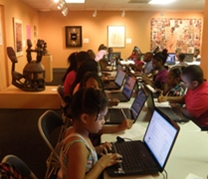Grant Spotlight | February 1, 2012
Share This |
Recipient Grant |
Contact |
||
The Tubman African American Museum is a vibrant cultural institution, located in the heart of Georgia, that educates people about African American history, art and culture, with an emphasis on encouraging racial understanding. In 2008, the museum realized that to spread its message effectively across a broad spectrum of the community, it needed to create programs that would integrate museum offerings directly into classrooms. With the help of an IMLS grant, the museum conceptualized and executed an "Arts & History Outreach Program" to fulfill this objective.
The Outreach program features three main components: "Outreach Teachers," who travel to schools and after-school programs to introduce students to the museum’s exhibits, artifacts, and collections, while providing instruction in such subjects as history, art, language arts, science, and math; a "Cabinet of Curiosities" that provides hands-on objects, curriculum materials, and information on African American inventors and inventions; and an array of "traveling exhibits" that focus on important African American contributions to American history and culture. These outreach offerings focus on building visual literacy, cross-disciplinary thinking and communication and collaboration skills, and they provide students, youth, and families access to museum exhibits, art and artifacts, and unique learning experiences that might not otherwise be available.
In the newest phase of the Outreach Program, the Tubman Museum is developing a distance learning component that will allow public, private, and home schools all over the state, region, and eventually the nation, to access live and archived Tubman Outreach Teacher presentations via the Internet. Dr. Andy Ambrose, the Tubman Museum’s Executive Director, commented on how excited the museum is to expand its scope online, "This distance learning component allows us to reach those locations and students that are more remote and that may not have any nearby museum facilities or resources."
As part of the IMLS-sponsored project, the museum has also created a series of "John Oliver Killens" student workshops that have had dramatic results in improving comprehension and test scores in math and reading for at-risk students. Designed for third and fifth grade students who have underperformed in these subject areas, the Killens workshops utilize exhibits, programs, and educational resources and experiences at the museum as well as trips to off-site events and local educational and cultural institutions to create a non-traditional classroom experience that stimulates student interest and helps improve understanding and performance. Students reflect on and express what they have learned in these experiences through journaling, art, and group and individual research and presentations. These workshops represent a unique partnership and collaboration between the Tubman Museum, the School of Education at both Mercer University and Macon State College, the public school system, and two local elementary schools. Each of these partners plays a key role in the program. Education faculty at Mercer and Macon State are responsible for creating and tweaking the curriculum and evaluative measures for the program, education majors at the two colleges serve as the actual workshop instructors, Tubman Museum education staff coordinates and oversees the program, and elementary school administrators and teachers select the third and fifth-grade students who will participate in the workshops. The Killens workshops are now in its fourth year, and over 200 elementary school students have now taken part – the overwhelming majority of whom have subsequently met or exceeded state and federally mandated test scores in both math and reading.
The Tubman Museum’s Art and History Outreach program, its new distance learning initiative, and the John Oliver Killens student workshops funded through IMLS have helped the Museum more successfully pursue its mission "to educate people about African American art, history, and culture" by expanding the Museum’s audience, its impact and its reach. "The support and encouragement on behalf of IMLS has been critical to our success in these areas," notes Dr. Ambrose, "and has helped us facilitate partnerships, collaborations, and additional funding that are helping us realize our efforts to get beyond the Museum walls and to find new ways to meet the educational challenges and needs stemming from cutbacks in school funding and lessened opportunities to connect schools to museums via field trips." Through these Outreach programs and offerings, students in Georgia are being given the opportunity to develop and utilize a number of 21st century skills, such as communication and collaboration; information, media and technology skills; visual literacy; cross-disciplinary thinking; and global awareness, and Georgia teachers are discovering new ways to use museum resources and programs to enhance the classroom learning environment.
